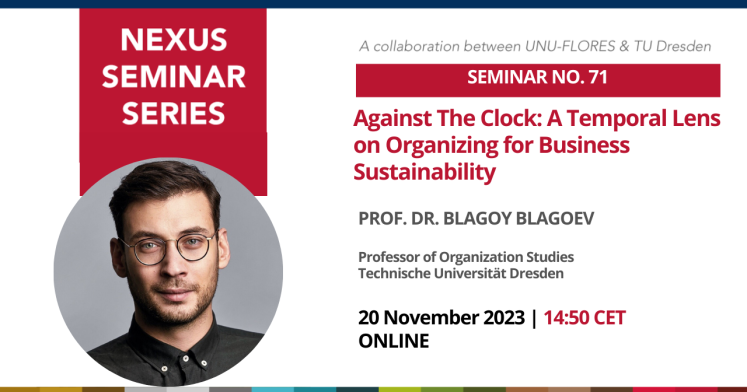Organizations which maintain a dual focus on both near and distant futures – ambitemporality – are more likely to develop comprehensive and robust responses to sustainability. However, achieving such a focus is an ongoing challenge for organizational actors, especially when the distant future implies a radical break with current business practices and strategies. In such situations, actors are likely to experience near and the distant futures as disconnected, contradictory, or even mutually exclusive and, thus, be unable to see how the two are interrelated. Building on a three-year qualitative study of a large automotive company, we examine how organizations deal with this challenge when undergoing major strategic change toward sustainability. We find that actors engaged in collective efforts to change established temporal patterns and assumptions toward more distant futures by strategically influencing the construal of the present: compressing it to create a sense of urgency and stretching it as to create a new sense of direction toward the future. We theorize this finding as presencing, a form of temporal work that enables actors to imagine, interrelate, and enact distant and near futures in the present. However, presencing also entails the risk of „over-stretching” the present, whereby distant futures are (ab)used as an excuse for maintaining unsustainable business practices. Our theorizing deepens current understandings of ambitemporality by detailing the benefits and pitfalls of presencing as a form of temporal work that can support organizations in addressing distant futures and becoming more sustainable.
About the Speaker: Prof. Dr. Blagoy Blagoev
Prof. Dr. Blagoy Blagoev is Professor of Organization Studies at Technische Universität Dresden (Germany). His research draws on a temporal lens to examine the interplay of people, organizations, and society in the context of current technological, ecological, and cultural transformations. His main research interests include (1) organizing and managing for sustainability, (2) emerging technologies and organizing, (3) new and decentralized forms of working and organizing, and (4) organizational change, innovation, and persistence. His work has appeared in leading international journals, such as Administrative Science Quarterly, Academy of Management Journal, Journal of Management Studies, Organization Studies, Organization and Scandinavian Journal of Management.
Background of the Series:
UNU-FLORES in collaboration with PRISMA – Centre for Sustainability Assessment and Policy on behalf of TU Dresden are excited to announce the Nexus Seminar Series. The joint seminar series, which launched in 2015, features lectures by senior scholars and successful practitioners that highlight all dimensions of research on the Nexus Approach, ranging from hands-on implementation strategies to theoretical debates. The Nexus Seminars serve not only as a platform for scientific exchange and cooperation between UNU-FLORES and TU Dresden but also a medium for the partner institutions to discuss their research with a broader audience. The Nexus Seminar, which takes place monthly during the academic semester, is open to the public and delivered in a digital format through online webinars.


